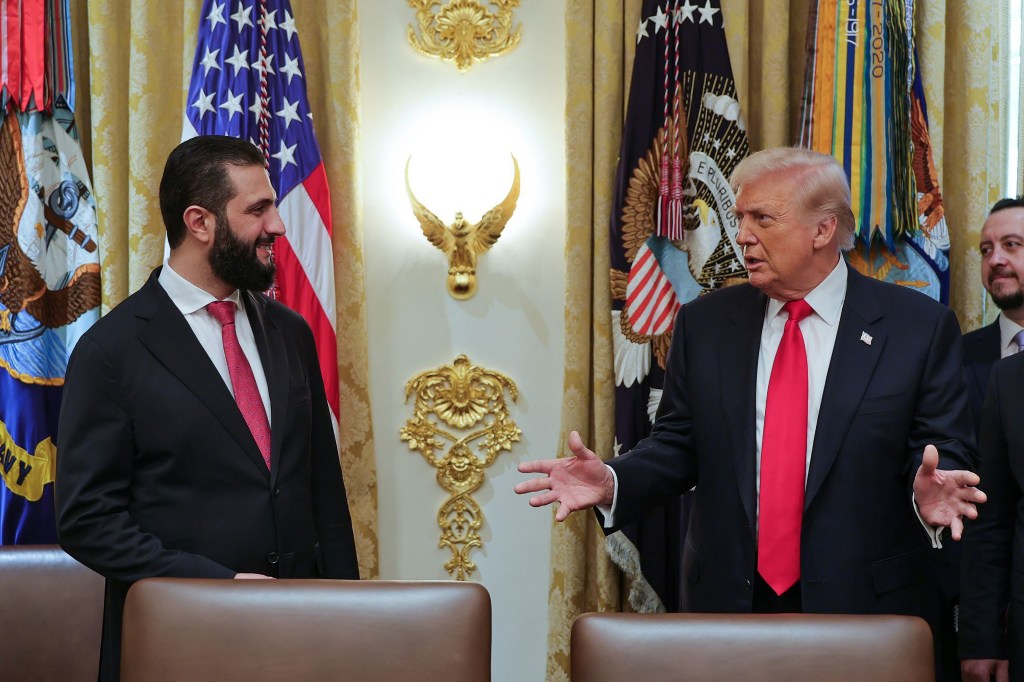President Donald Trump’s White House meeting with interim Syrian President Ahmed al-Sharaa was a continuation of his sound policy toward the new Syrian regime. News about Syria is often eclipsed by the conflict in Ukraine and ongoing tensions in Gaza, but what happens in the country matters to Americans. President Trump’s decision earlier this year to lift sanctions on Syria was a bold move that paved the way for positive change in the Middle East. His willingness to host al-Sharaa in Washington, alongside their previous meeting in Saudi Arabia in May, sent a strong signal that the United States doesn’t believe in permanent enemies and can adjust its posture as circumstances change.
The president deserves credit for taking important steps toward stabilizing Syria, but the situation remains fragile, and additional actions are needed. Violent clashes over the summer between ethnic groups threatened Syria’s internal peace and led to Israeli strikes that put immense pressure on al-Sharaa to respond. Syria’s president withstood this pressure and chose to continue a productive dialogue with Israel, but his ability to navigate future crises isn’t guaranteed.
Syria’s economy is decimated and its people are traumatized by a decade of war. Al-Sharaa’s control over the country is limited, and hardline elements in his coalition are challenging his authority. Some of the armed militias that helped him achieve power are beginning to act independently, and these groups perpetuated much of the fighting over the summer that led to Israel’s intervention and pushed Syria to the brink of renewed civil conflict. Al-Sharaa was able to salvage this difficult situation, but his position is tenuous and his hold on power far from assured. Unless he can improve the lives of Syria’s people and consolidate their support, al-Sharaa may be forced to give up power or resort to repression, something that would likely restart Syria’s civil war.
It’s in America’s interest to see al-Sharaa succeed. A year ago, it was inconceivable that Syria would be reaching out to the West, limiting its contact with Russia and negotiating with Israel. President Trump recognized these gains and made the controversial but correct choice to engage al-Sharaa, even though the Syrian leader had spent his early career fighting the American military in Iraq. This history makes al-Sharaa an unappealing partner but also gives him a degree of legitimacy in the eyes of the Syrian people. Unlike Iraq’s leaders in the aftermath of America’s 2003 invasion, Syrians aren’t inclined to see al-Sharaa as a Western puppet. Our experience in Iraq and Afghanistan taught us that post-conflict governments won’t succeed unless they’re seen as legitimate by the people they govern. Helping al-Sharaa maintain that legitimacy should be a goal of U.S. foreign policy, and even if he isn’t a perfect partner, the alternatives are too dangerous to entertain.
Were Syria to fail, Israel would face an immense security challenge along its northeastern border requiring an expensive and sustained military response. Ungoverned space in Syria would become a breeding ground for terrorism and might force direct American involvement. Avoiding these outcomes requires the use of every resource at our disposal to increase the likelihood that al-Sharaa’s government succeeds.
The next important step is for the U.S. Senate to complete the work President Trump began and remove the remaining sanctions on Syria. Allowing Syria to trade with the world and receive direct investment is critical but won’t be enough to stabilize the situation and it’s time to provide the country direct aid. There’s a chance this aid gets diverted to unfriendly actors or lost to corruption, but given the likely results of Syria’s failure, these are acceptable risks to take.
A failed state in the heart of the Middle East isn’t something we can ignore from our own national security perspective, and it would pose a serious threat to Israel. Even if Israel won’t be defeated by Syrian militias operating from ungoverned space, containing these groups will require extensive cross-border operations and put further pressure on international public opinion that’s already severely strained by events in Gaza. The Abraham Accords, and Israel’s peace treaties with Jordan and Egypt, survived the Gaza conflict but Arab leaders are perpetually worried about domestic public opinion and may reconsider their options if their citizens grow increasingly hostile to Israel. This is likely to occur if the Israeli military is forced to operate extensively in Syria.
By temporarily lifting sanctions and by hosting al-Sharaa in the White House, President Trump has already taken important steps to stabilize Syria. Creating the best chance to avoid the worst possible outcomes requires the permanent lifting of sanctions and a willingness to invest in Syria even as the president pursues his policy of reducing foreign commitments elsewhere. Al-Sharaa needs to show Syrians that his government can improve their lives. The White House meeting was powerful but not enough to secure the long-term goodwill of a restive population.
Syria is at a crossroads. The Senate should support the president’s productive engagement, and the legislative and executive branches should work together to provide al-Sharaa’s government with resources. There’s no guarantee that these resources will create a friendly and democratic Syria, but there’s a high probability that Syria fails without strong U.S. support. The collapse of al-Sharaa’s government would almost certainly usher in a new period of civil war. Not only will the suffering in Syria be immense, but dealing with the fallout will cost us more in the long run than the reasonable investments we can make today.
Colin Pascal (colinjpascal@outlook.com) is a retired Army lieutenant colonel who served as the chief of human intelligence and counterintelligence for Operation INHERENT RESOLVE in Iraq and Syria, and as an assistant Army attaché at the U.S. Embassy in Baghdad. He’s a graduate student in the School of Public Affairs at American University and lives in Annapolis.
